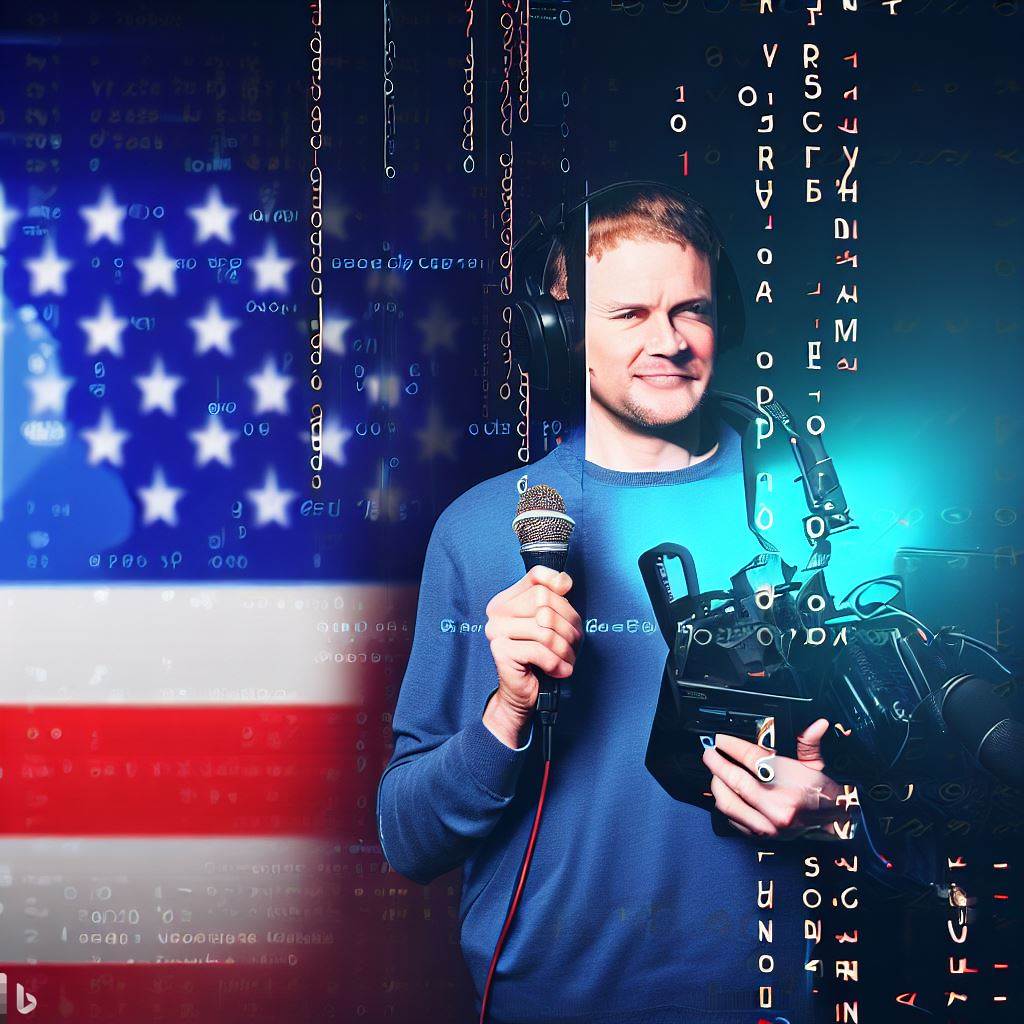Introduction
In today’s media landscape, coding plays a crucial role in powering various aspects of creative industries.
From website design to video production, understanding coding has become essential for professionals in creative fields.
Coding, the language of computers, enables creatives to bring their artistic visions to life on digital platforms.
It allows them to develop interactive websites, engaging mobile apps, and visually appealing graphics.
Without coding knowledge, creative professionals would be limited in their ability to fully utilize technology in their work.
Moreover, understanding coding empowers creative professionals to collaborate effectively with developers and programmers.
It enables them to communicate their ideas more clearly and facilitate seamless workflows.
By having a grasp of coding concepts, creatives can bridge the gap between design and implementation, ensuring that their vision is accurately translated into a functional and visually striking end product.
Additionally, coding proficiency gives creative professionals a competitive edge in the job market.
It demonstrates their adaptability and versatility in an increasingly digital world. With coding skills, they can contribute to a wider range of projects and collaborate with multidisciplinary teams.
Overall, coding is no longer confined to the realm of programmers and developers but has become an essential tool for creative professionals.
The ability to understand and utilize coding empowers them to create innovative and engaging experiences for audiences in the modern media landscape.
As we delve deeper into this topic, we will explore different ways coding can enhance creativity and the benefits it brings to the industry as a whole.
The Relationship between Coding and US Media
Coding has revolutionized the US media industry, powering its growth and innovation.
Through the use of code, various technologies have emerged, reshaping the way we consume and interact with media.
Tech Consulting Tailored to Your Coding Journey
Get expert guidance in coding with a personalized consultation. Receive unique, actionable insights delivered in 1-3 business days.
Get Started1. Revolutionizing the US Media Industry
Coding has played a pivotal role in transforming the US media industry into a dynamic and ever-evolving landscape.
From websites to apps, video games, and more, the power of code has given rise to new possibilities and experiences.
One prime example is the proliferation of websites. In this digital age, coding is the backbone of almost every website you come across.
Behind the captivating visuals and user interfaces lies lines of code meticulously crafted to deliver information and engage users.
Moreover, apps are another testament to the impact of coding.
From social media apps like Instagram to music streaming services like Spotify, coding drives the functionality and interactivity of these applications, improving user experience and bringing convenience to our fingertips.
Video games also owe their immersive experiences to code.
Through complex coding, game developers create intricate landscapes, realistic characters, and captivating storylines.
This allows gamers to be fully engrossed in the virtual world and actively participate in the narrative.
2. Enhancing Storytelling, Visuals, and User Engagement
Coding not only powers the technological aspects of US media but also elevates storytelling, visuals, and user engagement to new heights.
Code enables media professionals to create visually stunning and interactive experiences. For example, web developers utilize coding languages like HTML and CSS to design engaging and responsive layouts.
These layouts can adapt to different screen sizes, providing a seamless user experience across various devices.
Additionally, coding has given rise to innovative storytelling methods. Augmented reality (AR) and virtual reality (VR) are emerging technologies that rely heavily on coding to create immersive narratives.
Through code, media producers can transport audiences into alternative realities, allowing them to engage with stories in unprecedented ways.
Build Your Vision, Perfectly Tailored
Get a custom-built website or application that matches your vision and needs. Stand out from the crowd with a solution designed just for you—professional, scalable, and seamless.
Get StartedUser engagement is also significantly enhanced through coding. With the advent of social media platforms, code enables users to interact, share, and collaborate in real-time.
From liking and commenting on posts to participating in live streams, code connects individuals and fosters communities within the media landscape.
The relationship between coding and the US media industry is integral and transformative.
Through various technological advancements driven by code, media professionals can deliver engaging, interactive, and visually captivating experiences to consumers.
As coding continues to evolve, we can expect the US media industry to push boundaries and redefine the way we consume and interact with media.
Coding Fundamentals for Creatives
Listed below are the fundamental aspects that creatives should understand when it comes to coding for US media:
1. Basic understanding of coding languages
Coding for US media involves several programming languages, notably HTML, CSS, JavaScript, and more.
Creatives should grasp the fundamentals of these languages to effectively contribute to media projects.
2. Explanation of coding tools and software
There are numerous coding tools and software utilized by creatives in US media.
These resources aid in writing, testing, and debugging code, resulting in efficient and successful projects. Familiarity with these tools is essential for creative professionals.
3. Importance of learning coding concepts and terminology
For effective collaboration with developers in US media, creatives must understand coding concepts and be familiar with common terminology.
This knowledge enables better communication and mutual understanding, ultimately leading to seamless teamwork.
To delve deeper into each aspect:
1. Basic understanding of coding languages
Coding languages are the building blocks of any digital media project.
Optimize Your Profile, Get Noticed
Make your resume and LinkedIn stand out to employers with a profile that highlights your technical skills and project experience. Elevate your career with a polished and professional presence.
Get NoticedHTML (Hypertext Markup Language) provides structure to web content, while CSS (Cascading Style Sheets) styles and enhances the visual presentation.
JavaScript, on the other hand, adds interactivity and dynamic features to websites and applications.
By obtaining a basic understanding of these coding languages, creatives gain the ability to contribute valuable input during project discussions.
They can provide design insights based on the limitations and possibilities of the coding languages, resulting in visually compelling and functional digital media.
2. Explanation of coding tools and software
Coding tools and software play a pivotal role in the workflow of creatives in US media.
Integrated Development Environments (IDEs), such as Visual Studio Code and Sublime Text, offer a comprehensive coding environment with features like code completion, error checking, and project management.
Furthermore, collaboration and version control platforms like GitHub facilitate efficient teamwork among creatives and developers.
These tools enable seamless collaboration, ensuring that project files are up to date and changes are tracked effectively.
3. Importance of learning coding concepts and terminology
Effective collaboration between creatives and developers is crucial in US media projects.
Understanding coding concepts like variables, functions, and loops enables creatives to contribute ideas that align with the technical requirements of the project.
Moreover, familiarizing themselves with coding terminology ensures clear communication with developers.
This prevents misunderstandings and streamlines the workflow, resulting in faster project completion and higher-quality outputs.
In general, having a basic understanding of coding languages, utilizing coding tools and software, and learning coding concepts and terminology are fundamental for creatives in US media.
By equipping themselves with these coding fundamentals, creatives can effectively contribute to digital media projects and collaborate seamlessly with developers.
Read: Making a Difference: Coding for US Non-Profits

Role of Coding in Developing Media Projects
In the US media industry, coding plays a crucial role in bringing ideas to life, whether it is through designing and developing websites, apps, or multimedia content.
1. Bringing Ideas to Life
Coding is the driving force behind turning creative concepts into tangible projects. It provides the necessary framework for transforming abstract ideas into functional media products.
Through coding, media professionals can create interactive experiences that engage audiences and convey messages effectively.
By writing lines of code, developers can control how media elements like images, videos, and audio interact with the user, enabling a unique and immersive experience.
2. Designing and Developing Websites, Apps, and Multimedia Content
Coding is essential in every step of designing and developing websites, apps, and multimedia content in the US media industry.
Web developers use coding languages like HTML, CSS, and JavaScript to create the structure, layout, and functionality of websites.
Through coding, they can design visually appealing websites with smooth navigation and user-friendly interfaces.
Similarly, coding is crucial in app development, where developers use programming languages like Java or Swift to build the logic and user interfaces of mobile applications.
Moreover, coding is at the core of multimedia content development, where complex media elements are integrated into interactive experiences.
By using coding languages like ActionScript or JavaScript, developers can create visually stunning animations, interactive games, and multimedia presentations.
3. Clearing Common Misconceptions
There is a common misconception that coding is limited to technical tasks and only suitable for computer scientists.
However, in the US media industry, coding is a valuable skill for individuals in various roles, including designers, artists, and content creators.
Coding empowers creatives to have greater control over the final output of their media projects.
By understanding coding principles, designers can customize the look and interaction of their designs, creating unique and personalized experiences.
Artists can use coding to incorporate interactivity or generative elements into their visual creations, pushing the boundaries of artistic expression.
Content creators can leverage coding to enhance the storytelling experience by creating interactive narratives or immersive virtual reality experiences.
Therefore, coding is not limited to technical tasks but serves as a powerful tool for creatives to expand their possibilities and bring their visions to life.
In fact, coding plays a prominent role in developing media projects in the US media industry.
It brings ideas to life, facilitates the design and development of websites, apps, and multimedia content, and empowers creatives to realize their visions.
Clearing common misconceptions about coding being limited to technical tasks is essential to encourage more individuals from creative backgrounds to embrace coding as an integral part of their work.
By actively incorporating coding skills, US media professionals can push the boundaries of creativity and deliver impactful and engaging media experiences.
Read: Coding’s Role in America’s Green Energy Transition
Opportunities for Creatives in Coding
Discussion on how coding skills can boost career prospects in the US media industry
In today’s rapidly evolving media landscape, coding skills have become increasingly valuable to creative professionals.
With the rise of digital media and the constant need for innovative content delivery, knowing how to code can open up a world of opportunities for creatives in the US media industry.
By incorporating coding into their skill set, creatives can position themselves as valuable assets in an industry that is always seeking fresh and inventive ways to engage audiences.
Examples of creative professionals who have successfully integrated coding into their work
Numerous creative professionals have already embraced coding and leveraged it to enhance their careers in the US media industry.
One such example is John, a graphic designer, who learned how to code to create interactive user interfaces for websites.
This newfound skill allowed him to land a coveted position at a top digital media agency, where he continues to thrive.
Another example is Sarah, a filmmaker who learned coding to develop immersive virtual reality experiences.
By combining her storytelling skills with coding knowledge, she has been able to create captivating and cutting-edge projects, gaining recognition in the media industry.
How coding empowers creatives to take control of their projects and produce innovative content
Coding empowers creatives to take control of their projects by giving them the ability to bring their visions to life independently and with greater precision.
Instead of relying on developers to implement their ideas, creatives who can code have the autonomy to build their own websites, apps, and interactive media.
This level of control allows for immediate experimentation, iteration, and customization, resulting in truly unique and innovative content.
Moreover, coding helps creatives stay ahead of industry trends and adapt to technological advancements.
In a world where media consumption is shifting towards digital platforms, understanding coding allows creatives to seamlessly integrate their work into the evolving media landscape.
In short, coding skills offer a wide range of opportunities for creatives in the US media industry.
By combining their creative talents with coding knowledge, professionals can enhance their career prospects and stay at the forefront of innovation.
With coding, creatives have the power to shape and control their projects, leading to the production of innovative and captivating content that resonates with audiences.
As the media industry continues to evolve in the digital age, the demand for creative professionals with coding skills is certain to grow.
Embracing coding opens up a world of possibilities for creatives looking to make their mark in the US media industry.
Read: File Handling in Python: Reading and Writing Files
Resources to Learn Coding for Creatives
Are you a creative professional eager to expand your skill set and venture into the world of coding?
With the increasing role of technology in the media industry, coding has become a valuable tool for creatives to enhance their work.
In this section we will explore various resources and platforms tailored specifically for creative professionals looking to learn coding.
List of Online Platforms, Courses, and Resources
- Codecademy: Codecademy offers interactive coding courses in various programming languages, making it a great starting point for beginners.
- Udemy: Udemy provides a wide range of coding courses, including specialized tracks for creative professionals such as web design and game development.
- Coursera: Coursera offers coding courses from top universities and institutions worldwide, allowing you to learn from industry experts.
- Treehouse: Treehouse focuses on web development and offers courses on HTML, CSS, JavaScript, and more.
- FreeCodeCamp: FreeCodeCamp offers a comprehensive curriculum that covers front-end development, back-end development, and full-stack development.
- YouTube Tutorials: YouTube hosts numerous coding tutorials, including channels like The Coding Train and Traversy Media.
- Online Coding Bootcamps: Online coding bootcamps like General Assembly and Flatiron School provide immersive learning experiences for aspiring developers.
Tips on Balancing Coding Education with Creative Pursuits
- Create a Schedule: Set aside dedicated time for coding each day or week, ensuring that it doesn’t interfere with your ongoing creative projects.
- Break It Down: Instead of overwhelming yourself with extensive coding sessions, break your learning into smaller, manageable chunks.
- Combine Coding with Creativity: Look for opportunities to apply your coding skills to your creative projects, blending the two disciplines seamlessly.
- Find Like-Minded Individuals: Join coding communities or forums where you can connect with other creative professionals who are also learning to code.
- Take Breaks: Balancing coding education with existing creative pursuits can be challenging, so remember to take breaks and recharge when needed.
Inspiring Success Stories
- Casey Reas: Reas, co-creator of the influential creative coding platform Processing, started as an artist before delving into coding and pioneering new forms of digital art.
- Lauren McCarthy: McCarthy, an artist and programmer, combines coding and performance art to create interactive experiences that explore human relationships with technology.
- Josh Wong: Wong, a graphic designer, learned to code to enhance his design skills and now combines both disciplines to create visually stunning websites.
- Julia Kaganskiy: Kaganskiy, a curator and editor, acquired coding skills to better understand new media art, enabling her to curate groundbreaking exhibitions that blend art and technology.
By utilizing the abundance of online platforms, balancing your coding education effectively, and drawing inspiration from successful creatives who have paved the way, you can embark on your coding journey with confidence and creativity.
Read: Teaching Python to Kids: A Comprehensive Guide for Parents
Conclusion
Coding knowledge is crucial for creatives in the US media industry. It empowers them with the ability to develop innovative and expressive content.
Embracing coding as a powerful tool can lead to endless possibilities for creativity and growth.
Therefore, it is important for creatives to start exploring coding and its immense possibilities. By doing so, they can stay ahead of the curve in an ever-evolving industry.
Whether it’s developing interactive websites or creating cutting-edge visual effects, coding will enable creatives to push boundaries and stand out in their field.
So, I encourage all creatives to take the initiative and learn coding. There are numerous resources available online and in-person to help you get started.
Don’t be afraid to experiment and make mistakes. Coding is a skill that can be developed and honed over time.
By becoming proficient in coding, creatives can unlock a whole new level of creativity and innovation.
It opens up doors to collaborations and opportunities that may not have been possible otherwise.
So, let’s embrace coding and harness its power to revolutionize the US media industry. Together, we can shape the future of creativity and make a lasting impact.




